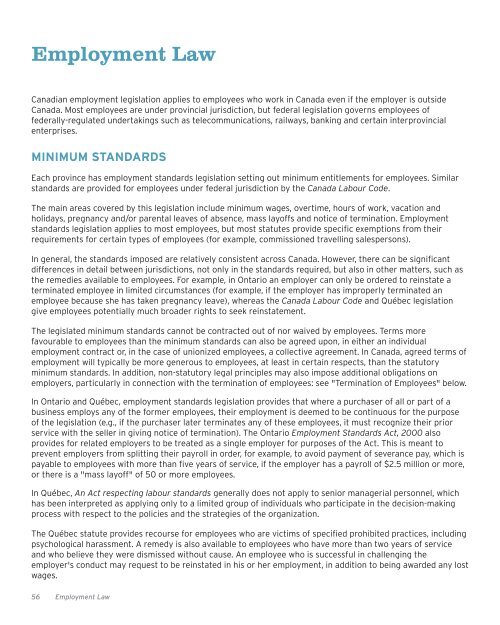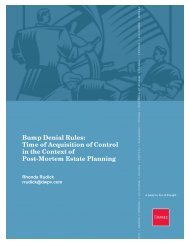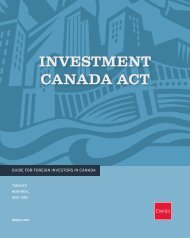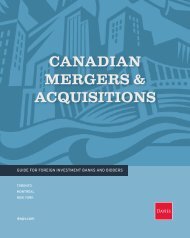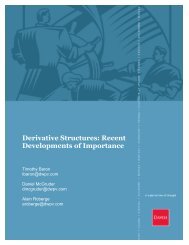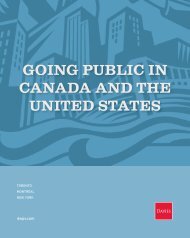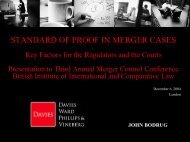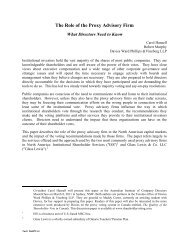doing business in canada - Davies Ward Phillips & Vineberg LLP
doing business in canada - Davies Ward Phillips & Vineberg LLP
doing business in canada - Davies Ward Phillips & Vineberg LLP
- No tags were found...
You also want an ePaper? Increase the reach of your titles
YUMPU automatically turns print PDFs into web optimized ePapers that Google loves.
Employment LawCanadian employment legislation applies to employees who work <strong>in</strong> Canada even if the employer is outsideCanada. Most employees are under prov<strong>in</strong>cial jurisdiction, but federal legislation governs employees offederally-regulated undertak<strong>in</strong>gs such as telecommunications, railways, bank<strong>in</strong>g and certa<strong>in</strong> <strong>in</strong>terprov<strong>in</strong>cialenterprises.MINIMUM STANDARDSEach prov<strong>in</strong>ce has employment standards legislation sett<strong>in</strong>g out m<strong>in</strong>imum entitlements for employees. Similarstandards are provided for employees under federal jurisdiction by the Canada Labour Code.The ma<strong>in</strong> areas covered by this legislation <strong>in</strong>clude m<strong>in</strong>imum wages, overtime, hours of work, vacation andholidays, pregnancy and/or parental leaves of absence, mass layoffs and notice of term<strong>in</strong>ation. Employmentstandards legislation applies to most employees, but most statutes provide specific exemptions from theirrequirements for certa<strong>in</strong> types of employees (for example, commissioned travell<strong>in</strong>g salespersons).In general, the standards imposed are relatively consistent across Canada. However, there can be significantdifferences <strong>in</strong> detail between jurisdictions, not only <strong>in</strong> the standards required, but also <strong>in</strong> other matters, such asthe remedies available to employees. For example, <strong>in</strong> Ontario an employer can only be ordered to re<strong>in</strong>state aterm<strong>in</strong>ated employee <strong>in</strong> limited circumstances (for example, if the employer has improperly term<strong>in</strong>ated anemployee because she has taken pregnancy leave), whereas the Canada Labour Code and Québec legislationgive employees potentially much broader rights to seek re<strong>in</strong>statement.The legislated m<strong>in</strong>imum standards cannot be contracted out of nor waived by employees. Terms morefavourable to employees than the m<strong>in</strong>imum standards can also be agreed upon, <strong>in</strong> either an <strong>in</strong>dividualemployment contract or, <strong>in</strong> the case of unionized employees, a collective agreement. In Canada, agreed terms ofemployment will typically be more generous to employees, at least <strong>in</strong> certa<strong>in</strong> respects, than the statutorym<strong>in</strong>imum standards. In addition, non-statutory legal pr<strong>in</strong>ciples may also impose additional obligations onemployers, particularly <strong>in</strong> connection with the term<strong>in</strong>ation of employees: see "Term<strong>in</strong>ation of Employees" below.In Ontario and Québec, employment standards legislation provides that where a purchaser of all or part of a<strong>bus<strong>in</strong>ess</strong> employs any of the former employees, their employment is deemed to be cont<strong>in</strong>uous for the purposeof the legislation (e.g., if the purchaser later term<strong>in</strong>ates any of these employees, it must recognize their priorservice with the seller <strong>in</strong> giv<strong>in</strong>g notice of term<strong>in</strong>ation). The Ontario Employment Standards Act, 2000 alsoprovides for related employers to be treated as a s<strong>in</strong>gle employer for purposes of the Act. This is meant toprevent employers from splitt<strong>in</strong>g their payroll <strong>in</strong> order, for example, to avoid payment of severance pay, which ispayable to employees with more than five years of service, if the employer has a payroll of $2.5 million or more,or there is a "mass layoff" of 50 or more employees.In Québec, An Act respect<strong>in</strong>g labour standards generally does not apply to senior managerial personnel, whichhas been <strong>in</strong>terpreted as apply<strong>in</strong>g only to a limited group of <strong>in</strong>dividuals who participate <strong>in</strong> the decision-mak<strong>in</strong>gprocess with respect to the policies and the strategies of the organization.The Québec statute provides recourse for employees who are victims of specified prohibited practices, <strong>in</strong>clud<strong>in</strong>gpsychological harassment. A remedy is also available to employees who have more than two years of serviceand who believe they were dismissed without cause. An employee who is successful <strong>in</strong> challeng<strong>in</strong>g theemployer's conduct may request to be re<strong>in</strong>stated <strong>in</strong> his or her employment, <strong>in</strong> addition to be<strong>in</strong>g awarded any lostwages.56 Employment Law


